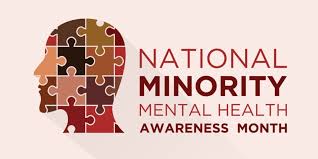Minority Mental Health Awareness
July marks Minority Mental Health Awareness Month, an important time to focus on the specific challenges minority communities face regarding mental wellness. Several systemic and social factors contribute to disparities in mental health care for minorities, necessitating increased awareness and action.
Key Statistics
Minorities are less likely to receive care for mental health issues. For instance, African Americans and Hispanic Americans use mental health services at about one-half the rate of white Americans. Furthermore, Asian Americans are among the least likely to seek mental health treatment, with cultural stigma often playing a significant role.
Barriers to Mental Health Care
There are several barriers that minority communities face when it comes to mental health care, including:
- Stigma:
Cultural beliefs may stigmatize mental illness, leading to a preference for handling issues privately rather than seeking external help.
- Access to Services:
Limited access to mental health professionals who understand different cultural backgrounds and can provide culturally competent care.
- Language and Communication:
Language barriers often prevent effective communication with healthcare providers.
- Socioeconomic Factors:
Economic deprivation can limit access to quality mental health services, coupled with the burden of untreated issues leading to employment struggles.
Consequences of Untreated Mental Health Conditions
When mental health issues go untreated, they can exacerbate other health conditions, lead to social and familial disruption, and lower overall quality of life. It may also result in negative socio-economic outcomes, such as increased unemployment and homelessness within minority communities.
Supporting Change and Promoting Mental Health
There are several actions individuals and communities can take to support mental health in minority populations:
- Increase Awareness:
Educate communities about mental health issues to dispel myths and reduce stigma.
- Advocate for Policy Change:
Support policies that aim to reduce mental health disparities by improving access to care, funding community health initiatives, and training culturally competent practitioners.
- Support Community Programs:
Volunteer or donate to organizations that provide mental health services to minority communities.
- Encourage Open Dialogue:
Create safe spaces where individuals can talk openly about their mental health without fear of judgment.
By understanding these challenges and contributing to solutions, we can help foster an environment where everyone has the opportunity to attain their best mental health.


